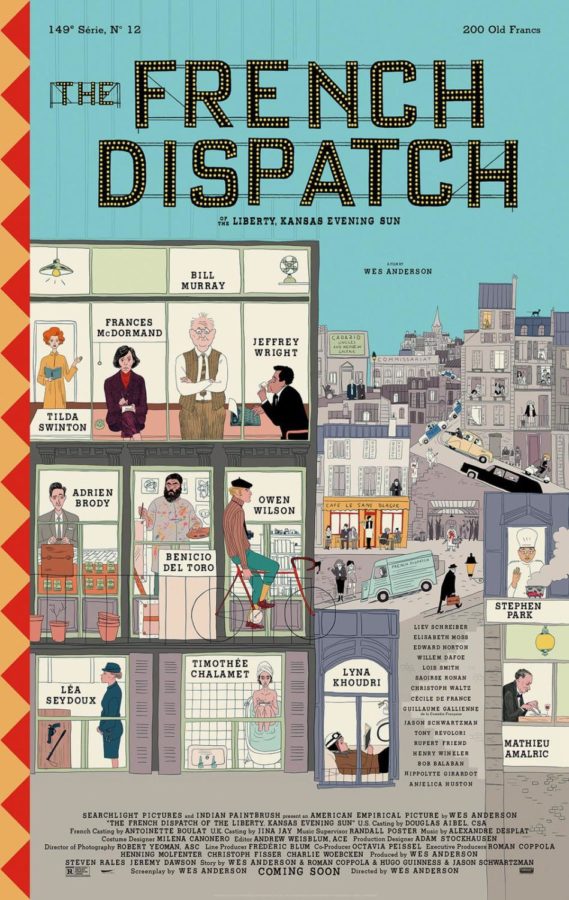Despite the theatrical outfits and characters, fabled symmetrically-placed frames, witty dialogue, and unique Je ne sais qui Wes Anderson so consistently integrates within all his films, “The French Dispatch” was not one of his best.
“The French Dispatch” takes place in the fictional world of Ennui-Sur-Blasé and is heavily inspired by “The New Yorker” magazine as well as characters inspired by many of Anderson’s favorite journalists. The film itself is based around the fictional newspaper known as “The French Dispatch of the Liberty, Kansas Evening Sun,” and the film is broken into three parts that connect to one main premise. Each “part” consists of a different story that a different editor of the newspaper is investigating. Their “journalistic neutrality” inevitably begins to diminish while they uncover the varying stories.
Despite covering different stories, the journalists all have one goal to complete their story and have it ready in time for publishing in the midst of coming to terms with the death of the Editor in Chief, Arthur Howitzer Jr (played by Bill Murray).
Anderson is known for his unique storytelling abilities and integration of unique cultures, colors, and languages as seen in all of his past movies, some of which being “Isle Of The Dogs”, “Moonrise Kingdom”, “The Fantastic Mr. Fox”, “Rushmore”, and various others. “The French Dispatch” is no exception to this claim.
Anderson takes advantage of French culture and its entirety through the successful integration of French architecture, music, and language. Unlike all of his previous films, Anderson also manages to successfully integrate an animated scene despite the rest of the film being entirely live-action. This is not typical within movies in general, and he does so while also switching the screen back and forth from highly-saturated images to black and white. Not to mention the cast; consisting of many big names like Adrien Brody, Timothee Chalamet, Owen Wilson, Edward Norton, Jason Schwartzman, and Anjelica Huston.
As a lover of all of Anderson’s films all the way from his first, “Bottle Rocket” and one of his latest, “The Grand Budapest Hotel” I had high expectations for Anderson to have the perfect soundtrack, craft the right characters, and pull together an inspiring as well as comical experience.
When the movie began I was excited and enthralled by the idea of Anderson taking so much inspiration from his favorite writers, french movies, and putting them into different fictional stories for his characters to investigate. However, the film began to cascade for me when I realized I was spending more time confused about where the plot was going instead of being excited to see where it would end.
I was impressed with the typical Anderson-esk uniquely crafted characters and witty dialogue, but vastly underwhelmed by the soundtrack; especially given the subjectively perfect soundtracks in “The Darjeeling Limited” and “The Royal Tenenbaums.” Although the soundtrack was lacking and the plot at times got a bit too slow, I do admire Andersons ability to successfully follow a three-story plot template that ties into one coinciding narrative; similar to the film “Pulp Fiction” minus the heavy drugs, excessive blood, and John Travolta.
It is admirable however that Anderson set the time period between “..1925 and 1975,” as said in an interview with “The New Yorker.” Anderson’s integration of specific historical periods like France in the 1960s while also maintaining that modernized film feel is highly exemplary.
Nonetheless, one of the biggest faults at hand was the high advertisement of Timothee Chalamet and Saoirse Ronan starring together in the film (as seen as evident in the trailer); whereas in reality, Chalamet had a good chunk of screen time but Ronan had an estimated one minute total. This idea however is not foreign and is also seen as evident with Margot Robbie in “Once Upon A Time in Hollywood”.
The film lacked in places that made me feel far more distant from the Wes Andersonian world in which I wholeheartedly desired to journey. It pains me to claim this was an unfortunate letdown and I only hope that in the future, Anderson incorporates some of the same elements from his earlier films.
For what it’s worth, the film was a cultural journey, but not one that I wish to return to in the near future.












